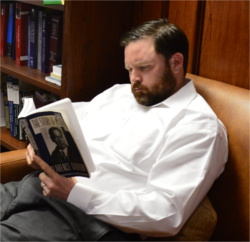Darrow’s The Story of My Life
 I must admit, if I am not reading for work, I read for escape. I do not often read legal themed fiction, and I have only read a few biographies of jurists. I stumbled across Clarence Darrow’s The Story of My Life and something about the old man’s piercing stare on the cover persuaded me to pick it up. At the time he wrote this book, Darrow had been practicing law more than ten times as long as I have. He was almost 50 years older than I am now. I think as an author he was a realist, to an extent, in that he knew the reader was mostly interested in his career and the great cases that made him legend. As I am a lawyer at the front-end of what I hope to be long, successful legal career, what I found most alarming was that this 483 page book only made passing references to his family. Mrs. Darrow, as he calls her, is a faithful travel companion and caretaker, but likely under-credited for his success.
I must admit, if I am not reading for work, I read for escape. I do not often read legal themed fiction, and I have only read a few biographies of jurists. I stumbled across Clarence Darrow’s The Story of My Life and something about the old man’s piercing stare on the cover persuaded me to pick it up. At the time he wrote this book, Darrow had been practicing law more than ten times as long as I have. He was almost 50 years older than I am now. I think as an author he was a realist, to an extent, in that he knew the reader was mostly interested in his career and the great cases that made him legend. As I am a lawyer at the front-end of what I hope to be long, successful legal career, what I found most alarming was that this 483 page book only made passing references to his family. Mrs. Darrow, as he calls her, is a faithful travel companion and caretaker, but likely under-credited for his success.
In any event, the book is fantastic. The specific accounts of his trials are an interesting read, but what I find to be most intriguing are his views on social, religious, and political questions. In the few thousand cases I have handled over the past five years I can connect with how a man at the end of a 50+ year career as an “attorney for the damned” (as Farrell titles his book) sees the world. A few chapters are “must reads” for any attorney or judge… hopefully a few jurors.
Chapter 38: Cause and Effect, gives Darrow’s logical and heartbreaking explanation of crime and human nature. Jurors and people in general would roll their eyes at what might be perceived as a “victim of circumstance” defense of crime and criminals. However, the words ring as true today as they ever did. “The prisons are not filled with the children of parents who were too kind. They are crowded with those who never had parental teaching and co-operation and discernment and help needed by the very young.” Just as the book begins by explaining the circumstances that led Darrow to greatness, this chapter explains that it is circumstance that leads the financially, emotionally, and mentally infirm to the prison gates. Darrow reasons man is an organism finding the easiest path to survival. The cause of criminality is not the nature of a man, but the nature of all men. Today as I walk a two blocks down to the Tarrant County jail this reality stares back at me through the Plexiglas. The world is painful and difficult for most. Man as an organism struggles to escape pain. It should be no surprise the escape of methamphetamine is so prevalent. Like the lion hunting or the buzzard scavenging, man as an organism struggles to survive. It should be no surprise our jails are full of thieves when our city has a few members at cocktail parties throwing away trays of expensive food towering over the streets where droves of tortured poor below only get calming medication when they have been arrested and taken to the psych floor at John Peter Smith.
Truly, Darrow spotlights the reality that the effect (crime) can never be remedied without addressing the cause (need and cruelty). Our leaders in Austin and Washington can do nothing to rid our world of the effect with more laws and harsher punishments. Until we, those few that are able, address the cause we shall suffer from crime and shall continue to cause suffering for most other humans (criminals). In the preceding chapter “The Campaign Against Crime” puts it well, “The first instinct of life is to keep on living, and every organism seeks it in the easiest way. The best scheme for the well-born and the well-to-do is in one direction; the easiest way for the poor and the outcast is in another.” I am afraid some of his more cynical words are true of our system of justice, “The State punishes, that is, inflicts pain, because it gives men pleasure to know that others suffer.”
You’re welcome to borrow my copy, or you can purchase the The Story of My Life for about $9.

